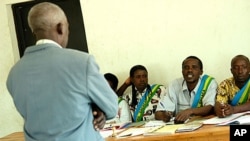As the work of Rwanda’s Gacaca court system nears its end, Human Rights Watch has issued a report that finds mixed results for the community-based courts in dealing with the genocide.
On Tuesday, New York-based Human Rights Watch released Justice Compromised, a 144-page report on Rwanda’s genocide courts.
In the aftermath of Rwanda’s 1994 genocide that left an estimated 800,000 dead, the country struggled to come to terms with the extent of the killings and crime that took place in just more than three months. By 1998, less than 1,300 genocide suspects had been tried, with another 130,000 in Rwandan jails designed to hold 12,000 inmates.
According to the report, Rwanda’s jails were so overcrowded prisoners began to die by the thousands.
Human Rights Watch researcher Carina Tertsakian said the unprecedented situation forced Rwanda to find an alternative.
“For these reasons primarily they decided to explore what they call Gacaca, which is a cross between a traditional form of community-based conflict resolution, and on the other hand a more conventional system of punitive justice that has some of the features of a modern criminal system,” said Tertsakian.
The Gacaca system allows the accused to face members of the community and victims to face punishment for their crimes and unearth details about the genocide itself. Through the community courts, family and friends of victims have been able to learn what happened to their loved ones and, in many cases, where they are buried.
Since implementing Gacaca in 2001, more than 12,000 courts have tried 1.2 million genocide cases. The courts have alleviated the massive pressures placed on the Rwandan justice systems. But according to the Human Rights Watch report, many judicial standards were sacrificed in order to implement Gacaca.
The report details many abuses, including intimidation of defense witness, corruption of judges and the use of the courts to settle personal scores. It says many of Gacaca’s judges also are inadequately trained, often leading to unfair proceedings.
In addition to the court’s failures, many of the crimes committed during the genocide have simply been ignored, such as rapes and acts committed by the Rwandan Patriotic Front - now Rwanda’s ruling party.
“The law was amended in 2004 and it was amended in such a way that it excluded those crimes," said Tertsakian. "The government, in fact, launched a campaign at that time to ensure that crimes allegedly committed by the Rwandan Patriotic Front were not discussed in Gacaca.”
While such crimes were supposed to be dealt with by Rwanda’s regular courts, Tertsakian said very few of those crimes have made it to trial.
On May 20, Rwandan Justice Minister Tharcisse Karugarama announced the Gacaca courts would officially close in December, nearly 10 years after they began.
Human Rights Watch is urging the Rwandan government to establish a review board staffed by professional judges to investigate possible abuses or shortcomings in the Gacaca proceedings and to address any failures of justice.
Report Finds Mixed Record for Rwanda’s Genocide Courts








